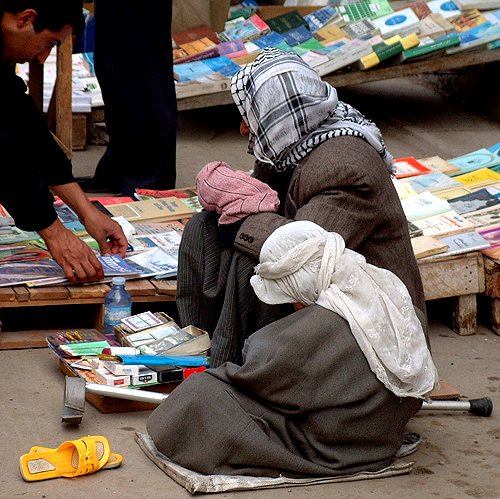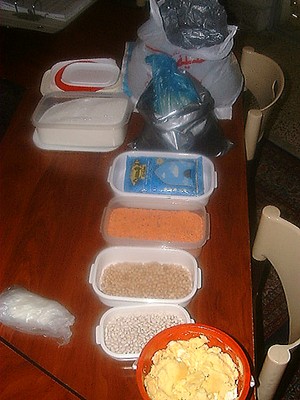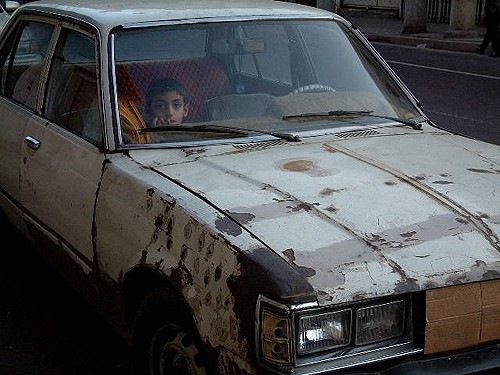|
Sanctions
- our moral problem
PressInfo #
173
March
4, 2003
By
Jan
Oberg,
TFF director and Christian
Hårleman,
TFF Boardmember
For many decision-makers it is convenient to focus on
the brutality of the Iraqi regime under Saddam Hussein
and leave the deeply inhuman consequences of our
sanctions over the last 12 years untold. But, in the eyes
of a visitor to Iraq, the moral high ground of the West
has crumbled. Before going to Iraq, we too were quite
ignorant about the facts and complexities; we were
shocked by the reality.
During our fact-finding missions we collected
statistics from international organisations, interviewed
virtually all the heads of missions of the United Nations
and humanitarian organisations. We met with Iraqi
officials and visited hospitals.
Playing down the
effects of our sanctions - without
evidence
Governments that have no embassies and no independent
fact-finding in Iraq can hardly know much. They must base
their policies on what is politically correct and
convenient for their policies in relation to other issues
and other countries.
Thus, for instance, the Swedish minister of foreign
affairs, Ms. Anna Lindh, has repeatedly stated that the
people of Iraq suffer because of Saddam Hussein's wrong
priorities and not because of the sanctions. She asserts
that a) the elite have received advanced medical
technology to treat cancer, but not the people; and b)
that since the oil export ceiling was lifted in 1999,
Iraq now exports more oil than ever. This presumably
implies that there is enough money to care for people's
needs. Other politicians have used similar arguments, and
the media willingly forwards them without research or
further questions asked.
Unfortunately, statements like these are not backed up
by evidence. And they do not cover even a fraction of the
comprehensive truth about the situation in Iraq.

© 2003 Jan
Oberg
Children in the bazaar area,
Baghdad 2003
The basic
facts
We have collected basic statistics concerning the
lives of the Iraqis from recent, open United Nations
reports that we obtained in Iraq in January 2003. (Thus,
they could have been collected by any scholar, journalist
and parliamentary delegation who wanted to know).
The data covers the changes that have taken place
since the late 1980s and early 1990s, i.e. a period in
which the regime has not conducted any wars. When
discussing the effects of the sanctions, it is not enough
to compare the situation in 1996 when the Oil for Food
Programme began to be implemented with today. It is true
that several improvements have taken place during that
period. The essential fact is that all statistical
indicators dropped in the preceding period between 1991
to 1995; Iraq wanted to care for its own people in spite
of the sanctions, and the government - like the
international community - had no idea that sanctions
would last more than a decade and cripple society to the
extent they did.
Second, the statistics compare the present situation
with the time when the Iran-Iraq war, the Kuwait invasion
and the allied war on Iraq had already reduced the
quality of life in the country. For instance, you will
see that today's GNP per capita is 15 per cent of what it
was after these terrible events.
DEMOGRAPHY
Iraqi population: roughly 24 million in 2000.
Some 45% of the total population is under 14 years
of age, only 4% is over 65.
CHILD HEALTH
- Infant mortality: 47/1000 in late 1980s, 107
now.
- Under-five child mortality: 56/1000 ten years
ago, today 131.
- Child death causes: 70% due to diarrhoea,
dehydration and acute respiratory infections.
- Malnutrition: Acute 8%, underweight 20%,
chronic 30%
- Water: 5 million without safe water. Between
1990 and 2000, the daily per capita amount of
potable water in both urban and rural areas
decreased by more than 50%.
- People attending outpatient clinics for
mental/psychological disorders: 200,000 in 1990 and
510,000 in 1998.
SCHOOLING
- No longer attending primary school: 31% girls,
18% boys
- No longer attending secondary school: 50% boys
and 60% girls
- Teacher salary: US $ 3-5; shifts, classes of
up to 60 pupils, outdated curriculum
5,100 new school buildings need to be built, 70%
of existing schools need rehabilitation
- Literacy rate 1998: 58%, used to be much
higher in the 1980s due to literacy campaigns;
thus, adult literacy rate was 72% in 1987.
- Female illiteracy has increased from 8% in
1985 to 45% in 1995.
POVERTY &
DEVELOPMENT
- GNP per capita/year down almost 7-fold since
1990 to US$700
- Value of Dinar: 0,33 to the dollar in 1990,
20,000 to the dollar in 2002; devaluation 6000%
- Oil revenue: 35 billion dollars between 1996
and November 2002
- Since 1991, Iraq's rank on UNDP's Human
Development Index fell from 96 to 127, out of 174.
No other country has fallen so far, so fast. In
1990, Iraq ranked three places above Jordan; by
2000, it ranked 34 places below.
- Pre-Gulf War debts US$ 130 to 180 billion, 25%
of oil income given away for war reparations (to
Kuwait).
FOOD
Roughly 3.7 million families currently receive
an average of 2,470 kcal per person per day from
the food ration. Food ration is distributed by the
Iraqi government through 40,000 shops.
*Statistics from various UN organisations'
publications obtained by TFF in Baghdad
2003.

© 2003 Jan
Oberg
Father and son selling their
books, Baghdad 2003
Other things you
may not know about the sanctions
A few other facts should be added:
a) There is no cash component
for central and southern Iraq.
Iraq as such does not receive cash for the oil it
exports. Through the Oil for Food Programme, it receives
food rations, medicine and goods (such as spare parts,
trucks, etc.) that must first be approved by the UN
Sanctions Committee. Nothing can enter the country
legally unless decided by that committee. If an item is
considered "dual use", i.e. can also be used for military
purposes, Iraq will not be allowed to import it. Only
northern Iraq gets cash and special programmes (see b);
central and southern gets no cash for the oil. Since the
cash component philosophy is based on a series of
conditions, among them that the international community
must control the country and secure that the cash can't
be diverted for the "wrong" purposes, it has been
unacceptable to Baghdad .
b) Iraq finances all
"humanitarian aid" through its oil export.
For the value of its oil export, Iraq receives:
59% in humanitarian supplies for the centre and south
covering food, health, medicine, transport and food
handling, water and sanitation, housing, electricity,
education, irrigation, agriculture, telecommunication,
etc.
25% goes to a compensation fund, e.g. payments to
Kuwait for the war.
13% goes to humanitarian programmes in the north
(Dahuk, Erbil, Suleimaniyah).
2.2% goes to cover operations costs such as
distribution and monitoring, bank-related charges, oil
and customs inspections, experts assisting the Sanctions
Committee, etc.
0.8% to the administration of the UN weapons
inspection programme.
So, at best 71% of the oil money comes back, in goods.
Only the northern, mainly Kurdish, minority enjoys
preferential treatment and cash. The cash that enters
Iraq is brought in through "secret" oil export,
smuggling, petty traders and the Mafia.
c) The items are distributed
through the Iraqi government system.
Iraqi families are registered in a local shop where
they pick up their monthly ration. There are about 40,000
such shops, supplied by the government. It's the largest
food distribution project in a single country in the
history of the United Nations. According to all
international sources we have spoken with, this functions
effectively given the overall socio-economic situation.
This means that the people are extremely dependent on the
present government. Should a new war destroy the food
distribution system and/or topple the government, destroy
roads, buildings, etc., UN mission assess that there
could be mass famine in Iraq within 6-8 weeks. In
addition, people who flee from their present homes will
not get rations elsewhere, only where they are registered
today.
d) The food rations are not
sufficient.
The monthly food baskets cover no more than the needs
of about 25 days. Even so, about 40 per cent of the
families have to sell items to get enough cash to buy
clothes or other necessities. The main reason, of course,
is that after three wars and twelve years of sanctions,
very few beyond the Mafia, the elite around the
leadership and the extremely wealthy have anything left.
They have long ago sold their jewellery, books, art,
porcelain, furniture, etc. - all of which foreigners can
now buy in "antique" shops in Baghdad.

© 2003 Jan
Oberg
Items from the food
ration
e) Iraq's oil export revenue
is far from enough to finance development.
Between December 1996 and the end of 2002, Iraq
exported oil to the value of US $ 61 billion. Oil
industry experts stated in 1998 that the country's oil
industry was in a "lamentable state". It exported fewer
barrels in 2001 and 2002 than it did in 1999 and 2000,
according to UN statistics of January 2003. While oil
revenues for 2000 were roughly US$ 18 billion, they were
roughly 11 billion in 2001 and 11 billion in 2002.
f) Sanctions kill innocent
Iraqis and suffocate Iraqi society.
The sanctions have killed an estimated 500,000 to 1
million innocent Iraqis since 1991. The estimates have
been done by different UN agencies, among them UNICEF.
They are not Iraqi propaganda. The deaths took place
particularly before 1996 when the Oil for Food Programme
began to be implemented. A typical expression among
internationals in Baghdad is that the sanctions are the
main contributors to the fact that a whole generation of
young Iraqis have been lost. That's what the health and
schooling statistics above confirm. And the young were
supposed to be those who reconstruct and democratise
Iraq. But how?
Inhuman and
counterproductive sanctions - the two
cages
So, what have we done since the "international
community" decided to punish Iraq for the invasion of
Kuwait back in 1991?
In the name of the United Nations, too, we have caused
a genocide. We have deprived millions of people of the
human right to health, education and welfare, something
that was an integral part of the Baath Party and Saddam
Hussein's development policy. We have caused
de-development throughout Iraqi society, the largest and
fastest fall in human development ever registered.
In the process, we have - unwisely - crushed the
educated middle class that existed there; Iraq is now a
mass of deprived people and a small elite of very wealthy
people. This means that we have also made the people
dependent, even for their daily food, upon the leader we
allegedly wanted to punish, weaken and topple. We have
crushed the social forces that could have pushed for
democracy, rule of law, human rights and freedom in Iraq.
We have caused many to leave Iraq.

© 2003 Jan
Oberg
Boy in car in Rasheed Street,
Baghdad
We, the authors, would not be surprised if the Iraqi
political and military leaders get what they need - and
more. The Swedish minister of foreign affairs may well be
right here. But are we really to believe that the
consumption and life style of these few thousands explain
why the remaining 23-point-something million people
suffer the terrible way they do?
The people of Iraq were not responsible for the
invasion of Kuwait. But they, not Saddam, have been
punished, put in prison for 12 years. They have lost
hope. They live inside the inner cage of the regime and
the outer cage of our sanctions. They know very well who
has insisted on keeping the sanctions in place, and it
would be wise to ask whether they are likely to receive
foreign occupiers as liberators?
Stop the three wars
on Iraq and heal Iraq together with its
people
Finally, there is much talk about a new military war
these days. But a war is already on; bombing raids have
been conducted by the U.S. and U.K. in the no-fly zones
for years and are now being stepped up. Foreign "special
forces" already operate in Iraq. In addition, the
citizens of central and southern Iraq have been victims
of economic warfare every day since 1991. They are also
objects of propaganda warfare. Their voices have seldom
been heard, and documentaries about their situation are
not exactly flooding our television screens. The media
show pictures only of Saddam with his rifles and swords.
We shall remember that Iraq is one bad guy and not 24
million fellow citizens in deep need of our sympathy,
empathy and compassion. We even let them pay for the
humanitarian aid that became necessary to keep them alive
in a living hell.
A tiny minority of governments may soon bomb, invade,
occupy and control Iraq, or try to. Even if conventional,
the firepower will be mass-destructive to the people. The
United States and the United Kingdom plan to use nuclear
weapons "if necessary." How can they even think of doing
that against a country in which half of the people are
children and youth who have lived all their life in
misery? Where is the Swedish and other governments'
diplomatic protests at the callous idea that nuclear -
and chemical - weapons could be used against Iraq?

© 2003 Jan
Oberg
When will our
policies take youth into account?
Sanctions are our mass-destructive weapon. Since 1991,
simple facts tell us that sanctions have killed and
harmed more people and destroyed more of society's
qualities than Saddam presumably ever did. And now a new
war? Shall there be no end to our ignorance and
cruelty?
These are dark and increasingly mad times. The West
seems so morally weak that we cannot take an open
discussion about the deeply inhuman consequences of our
own morally bankrupt policies. It's easier to blame
everything on Saddam, "the Evil", and insist that we are
only doing good. Reality is that we stand on the top of a
Mount Everest of propaganda, ignorance, and lies. All
wars require such - convenient - ignorance and lies.
Instead of war, we ought to lift the sanctions,
apologise to the Iraqi people, beg their forgiveness and
help them get back to normal, sooner rather than later.
If we did, they could then take action to decide their
own future. We certainly have no right to do it for
them.
PressInfo
176 explains why the sanctions will never be
lifted by the Security Council.
© TFF 2003

Tell a friend about this article
Send to:
From:
Message and your name
You are welcome to
reprint, copy, archive, quote or re-post this item, but
please retain the source.
Would
you - or a friend - like to receive TFF PressInfo by
email?
 
|